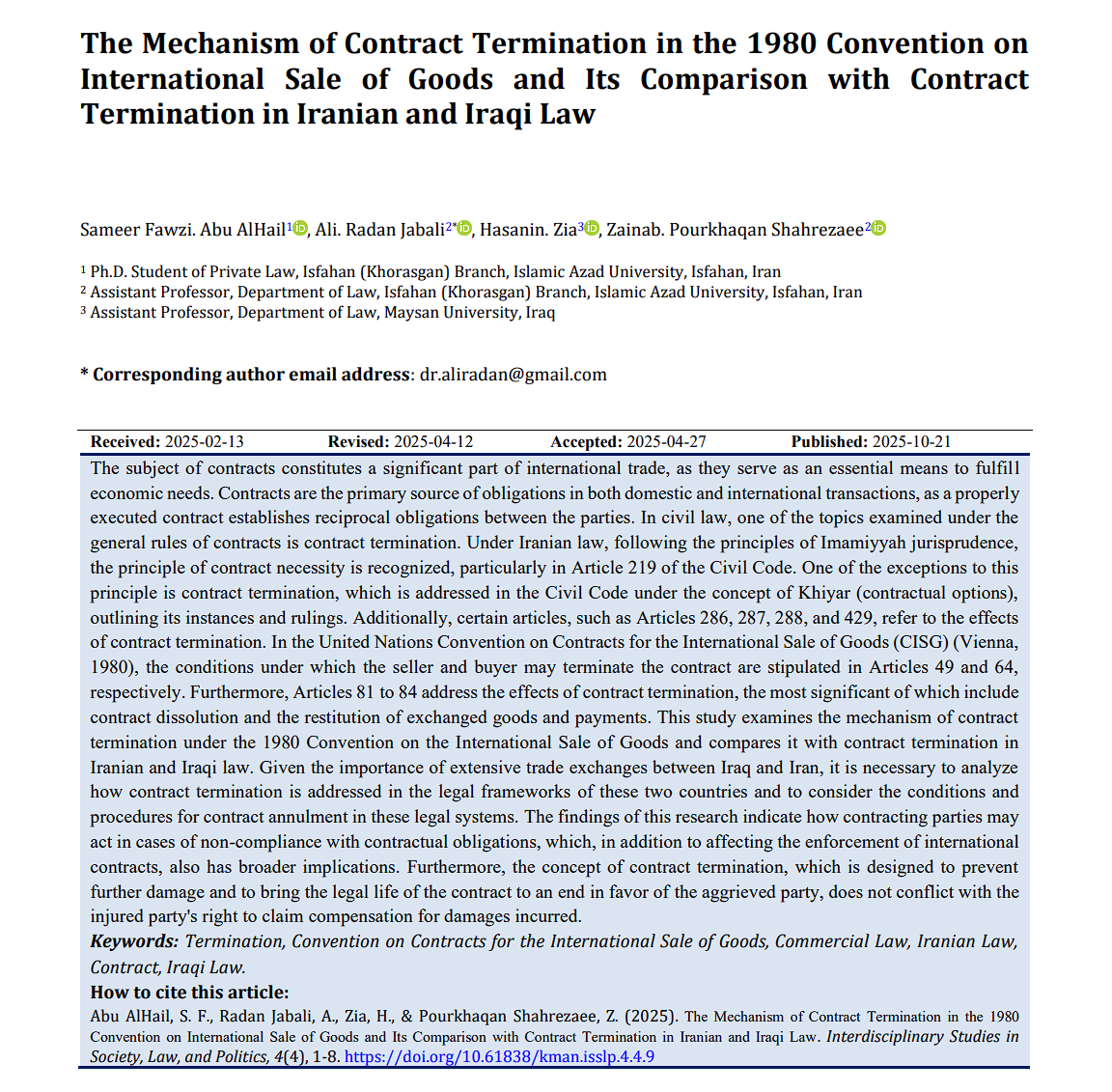The Mechanism of Contract Termination in the 1980 Convention on International Sale of Goods and Its Comparison with Contract Termination in Iranian and Iraqi Law
Abstract
The subject of contracts constitutes a significant part of international trade, as they serve as an essential means to fulfill economic needs. Contracts are the primary source of obligations in both domestic and international transactions, as a properly executed contract establishes reciprocal obligations between the parties. In civil law, one of the topics examined under the general rules of contracts is contract termination. Under Iranian law, following the principles of Imamiyyah jurisprudence, the principle of contract necessity is recognized, particularly in Article 219 of the Civil Code. One of the exceptions to this principle is contract termination, which is addressed in the Civil Code under the concept of Khiyar (contractual options), outlining its instances and rulings. Additionally, certain articles, such as Articles 286, 287, 288, and 429, refer to the effects of contract termination. In the United Nations Convention on Contracts for the International Sale of Goods (CISG) (Vienna, 1980), the conditions under which the seller and buyer may terminate the contract are stipulated in Articles 49 and 64, respectively. Furthermore, Articles 81 to 84 address the effects of contract termination, the most significant of which include contract dissolution and the restitution of exchanged goods and payments. This study examines the mechanism of contract termination under the 1980 Convention on the International Sale of Goods and compares it with contract termination in Iranian and Iraqi law. Given the importance of extensive trade exchanges between Iraq and Iran, it is necessary to analyze how contract termination is addressed in the legal frameworks of these two countries and to consider the conditions and procedures for contract annulment in these legal systems. The findings of this research indicate how contracting parties may act in cases of non-compliance with contractual obligations, which, in addition to affecting the enforcement of international contracts, also has broader implications. Furthermore, the concept of contract termination, which is designed to prevent further damage and to bring the legal life of the contract to an end in favor of the aggrieved party, does not conflict with the injured party's right to claim compensation for damages incurred.
Downloads
References
Ajil, T. K. (2016). Al-Mutawil fi Sharh al-Qanun al-Madani: A comprehensive and comparative study with Western and Islamic jurisprudence (Vol. 3). Beirut: Maktabat Zain al-Huqooq.
Coyle, J. F. (2017). The Role of the CISG in U.S. Contract Practice: An Empirical Study. University of Pennsylvania Journal of International Law, 38, 195. https://doi.org/10.5195/jlc.2020.170
Farhoumand, J. (2018). Installment contracts and their rescission under the Vienna Convention and Iranian law Master's thesis, Ardabil University].
Haji Gholam Sarizdi, M. (2020). Comparative study of the remedies for sale in the Iranian Commodity Exchange and the international sale of goods convention (1980). In: Doctoral dissertation, Yazd University.
Hassanpour, A. (2019). The concept of fundamental breach of international sale of goods under the sales convention in Iranian and English law Master's thesis, Islamic Azad University, Damghan Branch].
Johnson, W. P. (2011). Understanding Exclusion of the CISG: A New Paradigm of Determining Party Intent. Buffalo Law Review, 59(1). https://doi.org/10.21759/caulaw.2011.13.1.59
Karibi-Botoye, N., Enwukwe, N., & Timothy, B. B. (2021). The Passing of Risk in the International Sale of Goods: An Appraisal of the United Nations Convention on Contracts for the International Sale of Goods (CISG). Journal of Law and Policy, 1(2).
Karimi Aflak, M. (2019). Effects of rescission of the sale contract in Iranian law and the 1980 Vienna Convention on International Sale of Goods Master's thesis, Payame Noor University].
Kheiri Jabar, J., Ghabouli Darafshan, M. M., & Ansari, A. (2018). How to exercise rescission in the event of breach of contractual obligations under the 1980 international sales convention, Iranian law, and Iraqi law. Journal of International Studies, 58, 89-119.
Khodabakhshi, A. (2017). Urgency or delay in exercising the right of withdrawal. Journal of Private Law Studies, 47, 435-460.
Kiai, A. (2017). Obligations of the seller and buyer before and after the delivery of the subject matter. Tehran: Qoqnus Publications.
Mohaghegh Damad, S. M. (2016). General theory of conditions and obligations in Islamic law. Tehran: Center for Islamic Sciences Publishing.
Muhasnah, N. (2020). The impact of the blockade on Qatar on contractual obligations from the perspective of international trade laws: The United Nations Convention on Contracts for the International Sale of Goods 1980 and the UNIDROIT Principles 2016 as models. Qatar Publishing House. https://doi.org/10.29117/irl.2018.0045

Downloads
Additional Files
Published
Submitted
Revised
Accepted
Issue
Section
License
Copyright (c) 2025 Sameer Fawzi Abu AlHail, Ali Radan Jabali, Hasanin Zia, Zainab Pourkhaqan Shahrezaee (Author)

This work is licensed under a Creative Commons Attribution-NonCommercial 4.0 International License.





